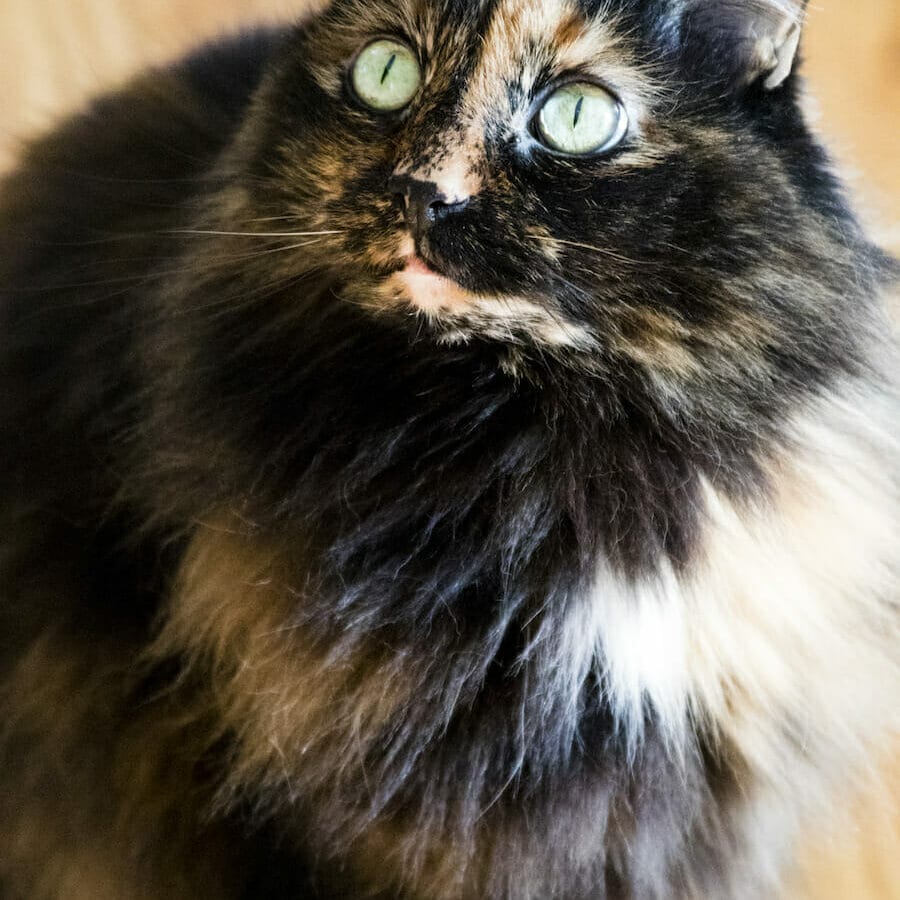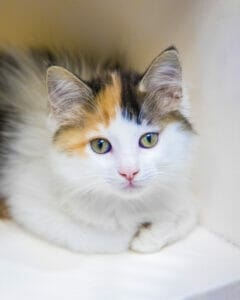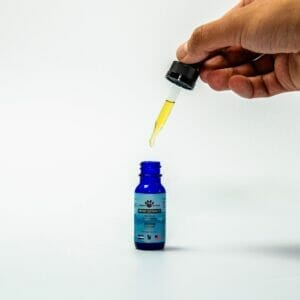A Guide for Using MCT Oil for Cats’ Health and Wellness
September 11, 2023
Written By: Earth Buddy Team

As pet owners increasingly look to natural supplements to improve the health and well-being of their animals, medium-chain triglyceride (MCT) oil has garnered attention for its potential benefits. Originating mainly from coconut oil, MCT oil has been researched for its impact on humans and dogs, but what are the benefits of MCT oil for cats?
What Is MCT Oil?
Medium chain triglycerides, commonly referred to as MCTs, are found in specific oils like coconut oil and palm oils, as well as in some dairy products. Sources containing other MCT oils include grass-fed butter, cheese, salmon, nuts, and seeds. MCT oil is essentially a concentrated form of these particular fatty acids.
Named based on their chemical makeup, which features between 6 and 12 carbon atoms, medium chain triglycerides (MCTs) differ from the more commonly consumed long-chain triglycerides. Their unique structure allows for quicker absorption and metabolism by the body, making them a rapid and effective energy source.
Acids Present in MCT Oils
MCT oil is comprised of four acids, including:
- Caproic acid (C6): Also known as hexanoic acid, caproic acid is the shortest of the medium-chain fatty acids and is quickly converted into energy. However, it’s typically present only in small amounts in MCT oil because it can have an unpleasant taste and odor.
- Caprylic acid (C8): This eight-carbon fatty acid is one of the most desirable MCTs due to the benefits rapidly absorbed by the body and converted into energy. Caprylic acid is also known to promote the body’s innate resistance to pathogens.
- Capric acid (C10): Another useful MCT, capric acid also offers benefits rapidly absorbed and metabolized, although not as rapidly as caprylic acid. It also shares some of the ability to promote innate resistance to pathogens, similar to caprylic acid.
- Lauric acid (C12): Lauric acid is a 12-carbon fatty acid that’s also found in high concentrations in coconut oil. While still considered an MCT, lauric acid takes a bit longer for the body to process compared to C8 and C10. It does, however, have the added benefit of supporting proper balance of normal intestinal flora.
Composition of MCT Oil
The composition of MCT oil can vary depending on the source and processing method, so it’s important to read labels if you’re looking for an MCT oil with a specific fatty acid content. Fresh coconut oil is one of the richest natural sources of MCTs, containing about 54-60% medium-chain fatty acids like caprylic acid, capric acid, and lauric acid.
The MCT content in palm oils is less predominant, roughly around 50%. Palm kernel oil also has a more neutral flavor and a higher melting point, which may make it less suitable for certain applications compared to coconut oil. Like coconut oil, palm kernel oil contains lauric acid, but usually in lower concentrations.
Other MCT oils, like ultra potency MCT oil, have a higher concentration of MCTs compared to regular MCT or coconut oil, often ranging from 95% to 99% purity. Due to its high concentration, the benefits are rapidly absorbed, offering an immediate energy boost and potential cognitive benefits. While lauric acid is an MCT, it is metabolized more slowly than caprylic and capric acids. Ultra potency MCT oils often minimize or eliminate lauric acid to maximize quick-energy MCTs to provide that immediate energy boost. While this can be beneficial, the benefits from lauric acid may not be present.
MCT Oil For Cats: Healthy Brain Function
MCT oil has gained attention for its potential to enhance healthy brain function in cats, particularly those in their senior years or experiencing cognitive decline. It also supports and promotes long-term health, which may be beneficial to cats in their golden years. The unique structure of medium-chain triglycerides allows for quick absorption and metabolism, providing an alternative energy source for the brain in the form of ketones.
Unlike glucose, which is the brain’s usual go-to for fuel, ketones are readily used by brain cells even when glucose metabolism becomes less efficient, as is often the case with aging. Although the research on cats specifically is still emerging, the rapid conversion of medium chain triglycerides into energy could support cognitive function, potentially helping reduce the effects of normal environmental stress.
MCT Oil for Healthy Immune Response
MCTs are known to support a healthy immune response, especially lauric acid, which can further promote the body’s innate resistance to pathogens. This enhances the immune response. MCTs also help maintain a normal inflammatory response. They can contribute to gut health by supporting the growth of beneficial bacteria in the intestines, thereby indirectly supporting the immune system.
MCT Oil and Weight Management
MCT oil has shown promise in supporting proper body weight management for cats, an increasingly important consideration given the rise of cats moving the scale more than they should. The unique medium-chain fatty acids in MCT oil are quickly metabolized and can promote a feeling of fullness, which may help reduce overall calorie intake.
These fats are rapidly converted into energy rather than being stored, making them less likely to contribute to body weight gain compared to long-chain triglycerides commonly found in other oils. Incorporating MCT oil into your cat’s diet, alongside a balanced, portion-controlled meal plan, could aid in proper body weight management.
MCT Oils For Skin and Coat Health
MCT oil has been noted for adding luster and shine to coats and promoting healthy skin, not just in humans or dogs but also in cats. Rich in fatty acids like caprylic and lauric acid, MCT oil can provide nutritional support for healthy coats and help maintain the normal moisture content of the skin.
The oil also provides essential nourishment to hair follicles, which can help achieve a soft, silky, shiny, and healthy coat. If your cat is struggling with a dull coat, incorporating a small amount of MCT oil—either applied topically or included in their diet—could offer occasional relief from discomfort. And it can often be used for animals with sensitive skin.
Look For Quality MCT Oils
When it comes to selecting a high-quality MCT oil for your cat, there are several factors to consider to ensure you’re getting the best product. First and foremost, always opt for a food-grade oil that’s free from additives, preservatives, and artificial flavors. Check the label for a breakdown of the medium chain fatty acids contained; a high-quality MCT oil will typically have a higher concentration of caprylic (C8) and capric (C10) acids, which are more readily absorbed and metabolized.
It’s also beneficial to choose an MCT oil that is sourced from reputable suppliers and offers third-party testing to ensure purity and quality. Organic and non-GMO options are generally preferable.
When using coconut oil for its MCT content, it’s best to opt for virgin or cold-pressed fresh coconut oil, as these types are less processed and contain more nutrients than heavily processed or hydrogenated varieties.
MCT Oil in CBD for Cats
MCT oil is often added to CBD for Cats for several key reasons that enhance the overall effectiveness and utility of the product:
- Increased bioavailability: MCT oil is easily absorbed by the body, and when it’s used as a carrier oil for CBD, it can increase the bioavailability of the cannabinoids, making them more readily absorbed into the bloodstream.
- Quick metabolism: MCTs are metabolized more quickly than long-chain triglycerides, providing a quicker delivery system for the active compounds in CBD for cats.
- Taste and texture: MCT oil is generally tasteless or slightly nutty, and it can improve the overall taste and texture of hemp extracts, which can sometimes have a strong, earthy flavor that not everyone finds pleasant.
- Easy to measure and use: MCT oil remains liquid at room temperature, making it easy to measure, mix, or even drop under the tongue. This is especially useful for precise dosing of CBD for cats, whether it’s being consumed by itself or added to food or beverages.
- Extended shelf life: MCT oil is less likely to go rancid compared to other oils, providing a longer shelf life to the CBD for cat products it’s added to.
- Additional health benefits: While the primary purpose of adding MCT oil to hemp extract is to serve as a carrier, MCT oil itself has health benefits, including quick energy release, which may complement the effects of CBD for Cats.
- Compatibility: MCT oil is mostly colorless and odorless, which makes it compatible with CBD for Cats without altering their natural properties.
So, the addition of MCT oil to CBD for cats serves multiple functions: it enhances absorption, improves taste and stability, and can even add its own set of health benefits to the final product. And, if you have already tried MCT oil for dogs, the MCT oil included for cats will likely be the same, but with the dosage altered.
For further reading, we recommend:
- https://pubmed.ncbi.nlm.nih.gov/29601492/
- https://www.ncbi.nlm.nih.gov/pmc/articles/PMC7799411/
- https://www.ncbi.nlm.nih.gov/pmc/articles/PMC9264852/
- https://www.mdpi.com/2076-2615/10/5/834
- https://www.ncbi.nlm.nih.gov/pmc/articles/PMC2874190/
- https://translational-medicine.biomedcentral.com/articles/10.1186/s12967-023-03880-7
You Might Also Enjoy
Reactive dog barking may sound intimidating, but it’s important to differentiate it from dog aggression.…
Your dog’s skin is their largest organ making dog skin care a crucial part of…
Like us, our dogs, and other mammalian species, cats have an endocannabinoid system. This system…







